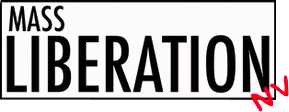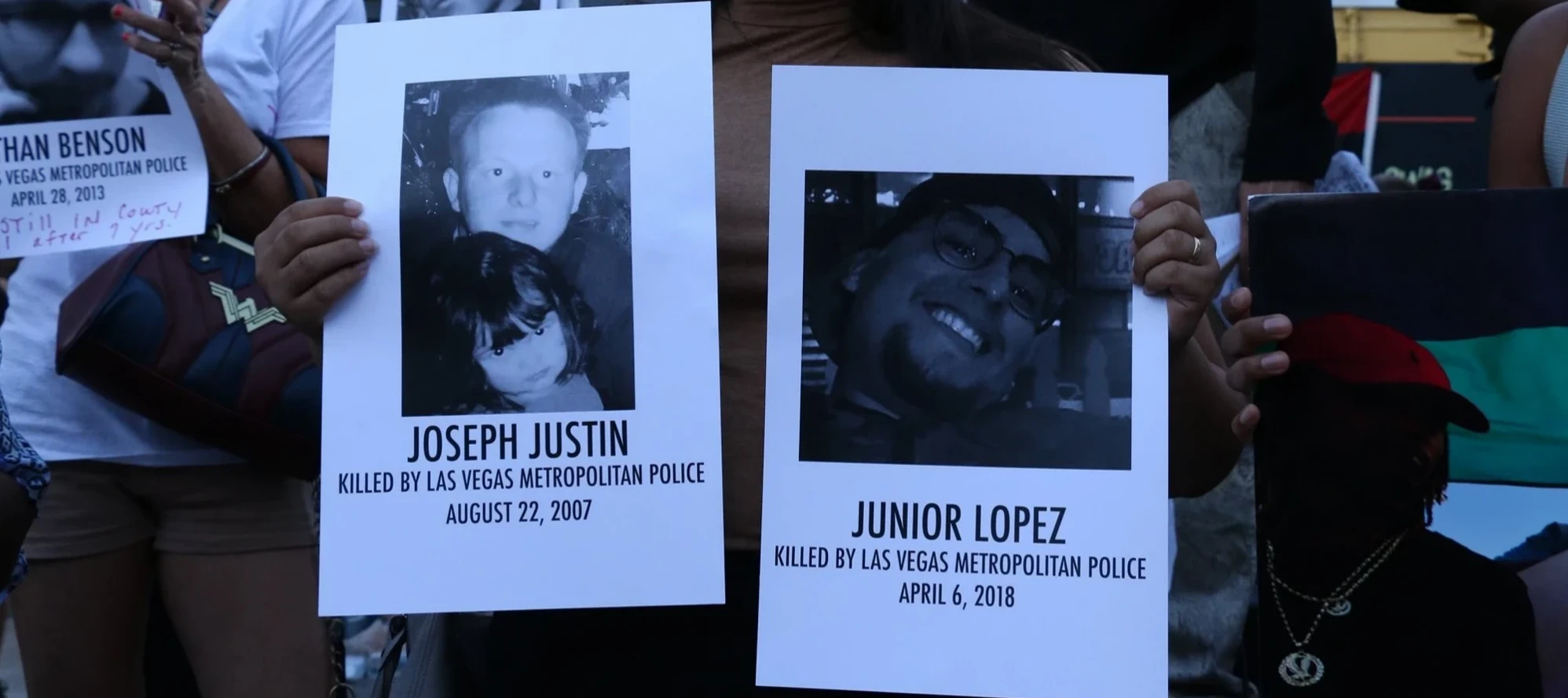Cover photo: Ariah Justin, daughter of LVMPD homicide victim Joseph Justin holds up a photo of her and her father and a photo of LVMPD homicide victim Junior Lopez at a protest for George Floyd, downtown Las Vegas, May 30, 2020. Photo by Nissa Tzun, Forced Trajectory Project
Reporting by Rachel Karabenick
Photos by Eduardo Rossal-Cabrera and Nissa Tzun
Las Vegas, NV – Mass Lib Monday is a weekly meeting open to the public where Nevadans can discuss issues related to criminal justice reform. It is hosted by The Mass Liberation Project, an organization that supports grassroots organizing to abolish the criminal legal system as we know it.
This week’s Mass Lib Monday was focused on centering the voices of Nevadans impacted by police violence and discussing what we can do as a community to support efforts being made currently to transform policing in the legislature. Joining this call were members of Families United 4 Justice Las Vegas and More Than a Hashtag.
The call began with a moment of silence to honor the space, and pay tribute to 20 year old Daunte Wright, a young father who was shot and killed by Minneapolis police officer Kim Potter during a traffic stop this past Sunday, April 11th 2021. According to CNN News, the officer claimed to have shot Duante ‘accidentally’ and had meant to use her taser. Officer Potter and the Police Chief have both resigned and Potter was just arrested and charged for second degree manslaughter.
Nissa Tzun and Oja Vincent from Forced Trajectory Project kicked off the call with an opportunity for introductions in the chat where attendees shared their names, pronouns and reasons for joining the call.
Yesenia Moya of the Mass Liberation Project welcomed attendees and recapped some of the comments left in the chat. She explained that today’s meeting will contain heavy topics and encouraged people to take breaks if needed.
History of Policing in the U.S.
Oja took the group through a brief history of policing in the U.S. to highlight the historical roots of police violence and systemic racism in law enforcement. He began by acknowledging that we are on Paiute land. The Paiute are indigenous people of Southern Nevada, descended from the The Tudinu (or Desert People) who once occupied areas surrounding the Colorado River, most of Southeastern Nevada and parts of Southern California and Utah. Before the arrival of Christopher Columbus in the 15th century there were no prisons or police in these lands.
Criminalization & Whiteness
The first formal “law enforcement” agency in the U.S. were the “Night Watchmen.” Formed in the 1600s, they were responsible for taking land and enacting the genocide that continues to this day. Their role was to protect colonist invaders and their “property” and their existence sewed the concept of “criminalization” into our nation’s history. The Night Watchmen were notorious for their drunken, vagrant behavior and abusing their power.
In 1838 the first police department was created to protect the property of the rich and to disrupt workers rights organizations. By the 1880s there were police departments in most major U.S. cities.
Racism in Policing
When they first came to the U.S., Irish and Italian immigrants were not initially perceived as white and faced discrimination. However, as police departments began to form in the U.S. these immigrants were able to join police forces as a means of assimilation, thereby gaining the privileges of whiteness.
In the south, the focus of police was to return people into enslavement. In fact the term “police patrol” is a relic from the days of chattel slavery when a primary role of police was to patrol for enslaved people that had escaped. During this time police were perpetrators of mass terrorism, family seperation, torture and rape of enslaved peoples.
Since Black people at this time were not considered humans, they were treated as property by law enforcement. In the 1850s, when Dred Scott (an enslaved Black man) was taken by his enslavers from the south into a northern territory where slavery was not legal, he sued the U.S. government for his freedom.
In 1857 the Supreme Court ruled that Black people “are not included, and were not intended to be included, under the word ‘citizens’ in the Constitution and ruled against Dred Scott.
After the assassination of Lincoln in 1865, President Johnson pardoned all slave holders of any legal responsibility. Inequality of African Americans in the eyes of the law persisted through the Jim Crow Era which effectively created the American apartheid.
Law & Order
In the early 1900s the idea of “public order” became popularized and became a competition among politicians to show they were “tough on crime.”
U.S. police departments continued to act as agents of the state. Police captains and high ranking officers were hand picked by political leaders. Police were known to bully voters and harass political opponents of those that appointed them. And since much of the wealth that existed at this time was inherited from the days of chattel slavery, police were still effectively protecting the property of the white, upper class.
Civilian review boards and other police oversight groups have been formed, and “reform” has continued to be promised but ultimately, these measures have been enacted largely to pacify citizens and have done nothing to truly overhaul this racist, violent and oppressive system.
There have been roughly 20,000 police raids per year since 2011 (not including ICE raids) and clearly as we have seen in the case of Breonna Taylor and countless others, Americans are still being murdered by police.
Despite the issues the US has with excessive use of force by law enforcement, no government agency actually tracks police-related killings at the hands of the state. This is why we must rely on databases created by civilians, community and media organizations.
Centering Impacted Voices
In the next portion of the call, family members of individuals murdered by police in Nevada and the surrounding areas spoke about the loved ones they have lost and the importance of supporting legislation aimed at transforming policing in Nevada. Leslie Turner, lead organizer of the Mass Liberation Project, and Nissa of the Forced Trajectory Project led this portion of the call and introduced these family members.
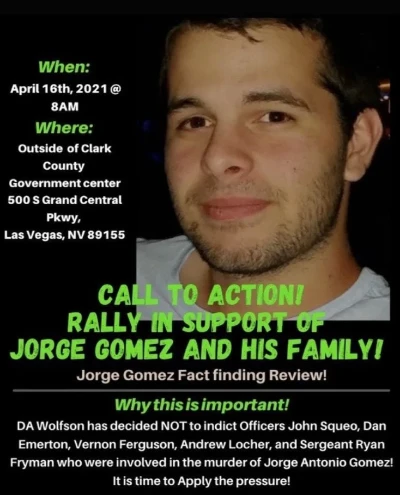
Flyer courtesy of More Than A Hashtag LV.
Jeanne Llera: Mother of Jorge Antonio Gomez – Murdered by LVMPD June 1st, 2020
Jeanne Llera is a member of Families United 4 Justice Las Vegas (FU4JLV) Jeanne’s son Jorge Antonio Gomez was stolen while he was leaving a Black Lives Matter protest last summer. Jorge was walking back to his car after the protest while open carrying, which was his Second Amendment right. He had just texted his father to let him know he was headed home.
Although there were dozens of cameras in the area, police only released a few videos collected from social media to the public. Several months later, the family was finally provided video which they themselves had to release.
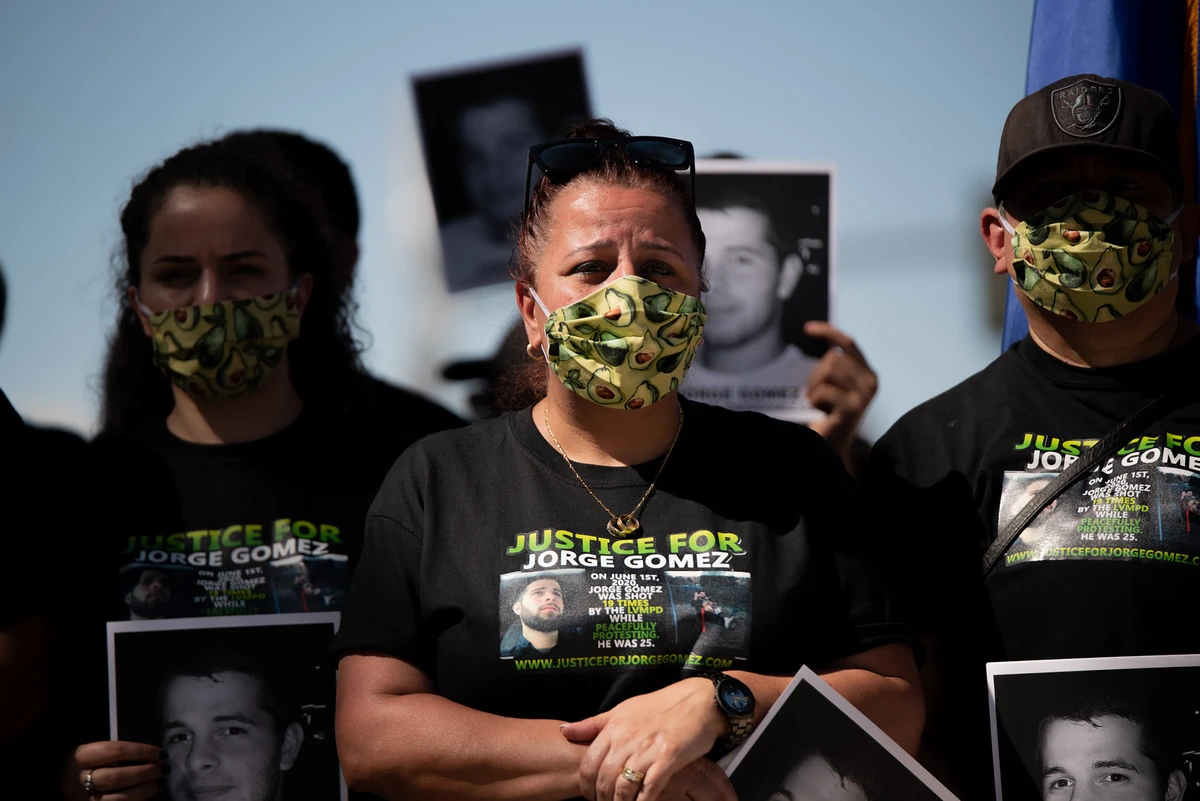
This video revealed that Jorge was moving away from police after being fired at with non-lethal rounds. Although he had nothing in his hands at the time he was rushed at by officers and was shot 19 times by four LVMPD officers. Police kicked him and handcuffed him as he lay on the ground and refused to allow medical attention. Jorge was left to die on the ground.
Jorge’s mother has been reached out to by multiple people that told her of Jorge’s acts of kindness that night – helping other protestors and giving money to a homeless veteran. She spoke about Jorge’s love of nature and animals. Jorge had attended the protest because he was an ally, and now, we have to fight for him too.
Jeanne asks that people please contact District Attorney Steve Wolfson, Governor Steve Sisolak and Nevada State Legislators to ask them to support AB131 and AB133 which are bills inspired by her son. She also asked people to visit Justice for Jorge Gomez to learn more about how to help.
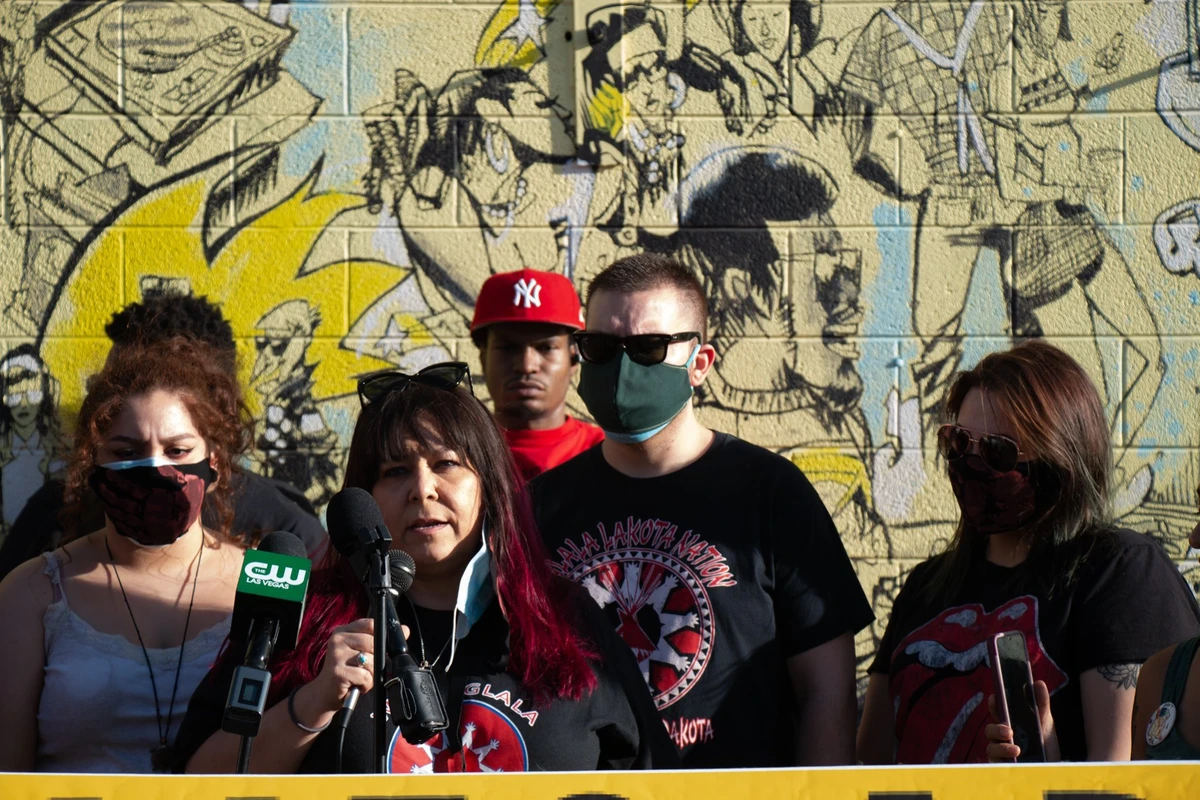
Petra Wilson: Wife of Rex Wilson – Murdered by LVMPD October 12th, 2016
Petra Wilson is a member of the Oglala Sioux Tribe and mother to nine children. Her husband, Rex Wilson, was a U.S. Marine Corps veteran. She is a board member of FU4JLV.
Rex Wilson was shot 36 times by the LVMPD. His family believes he was having a mental health crisis at the time the police murdered him. Petra is still involved in a legal battle surrounding her husband’s death because of issues related to her lawyers. She spoke of how difficult it is to find good legal representation in these cases because the person has already been presumed guilty by the police and the media. One of the officers involved in killing her husband, John Squeo, was also involved in Jorge Gomez’ death.
Petra said that you really don’t know if you will become a part of this group (FU4JLV) and that it’s hard to imagine what you see in the news could happen to your family. She said how important it is for everyone to support current policing bills being proposed at the legislature, and that it takes a lot of policy and legislation to make change. She hopes to see the bills go forward. She hopes people support her family and progressive legislation that will help protect everyone.
Petra spoke about the state of shock you go into when a family member is killed by police – that it’s something you can never prepare for. Your system is flooded with adrenaline and the recovery is long and difficult. Lack of resources is stark – mental health services are limited here in Nevada. She told the group that at a Use of Force panel she attended they bragged that they train all officers in two weeks on use of force, which is such a short amount of time.
She also highlighted the fact that some police officers are too young. Most people are not fully developed mentally in their early twenties. They lack the emotional capacity needed to make good decisions.
Native Americans are the most likely to be killed by police. Prejudice runs high and it’s accepted. She said after five years the pain of her loss remains strong. She said police should not be the judge or jury. And no one should have to tell their son that they can’t just walk down the street just because of what they look like. That’s hard to do. “You want them to believe in the dream,” she said. “One of the most difficult realities is our kids can’t just walk out the door.”
She urged people to make statements in favor of the proposed legislation, and to follow up to ensure your comments are entered into the official record. She thanked Nissa of FTP for pulling her out of the darkness and bringing her into this work, and thanked the group for opportunities to share her story and to help make changes.
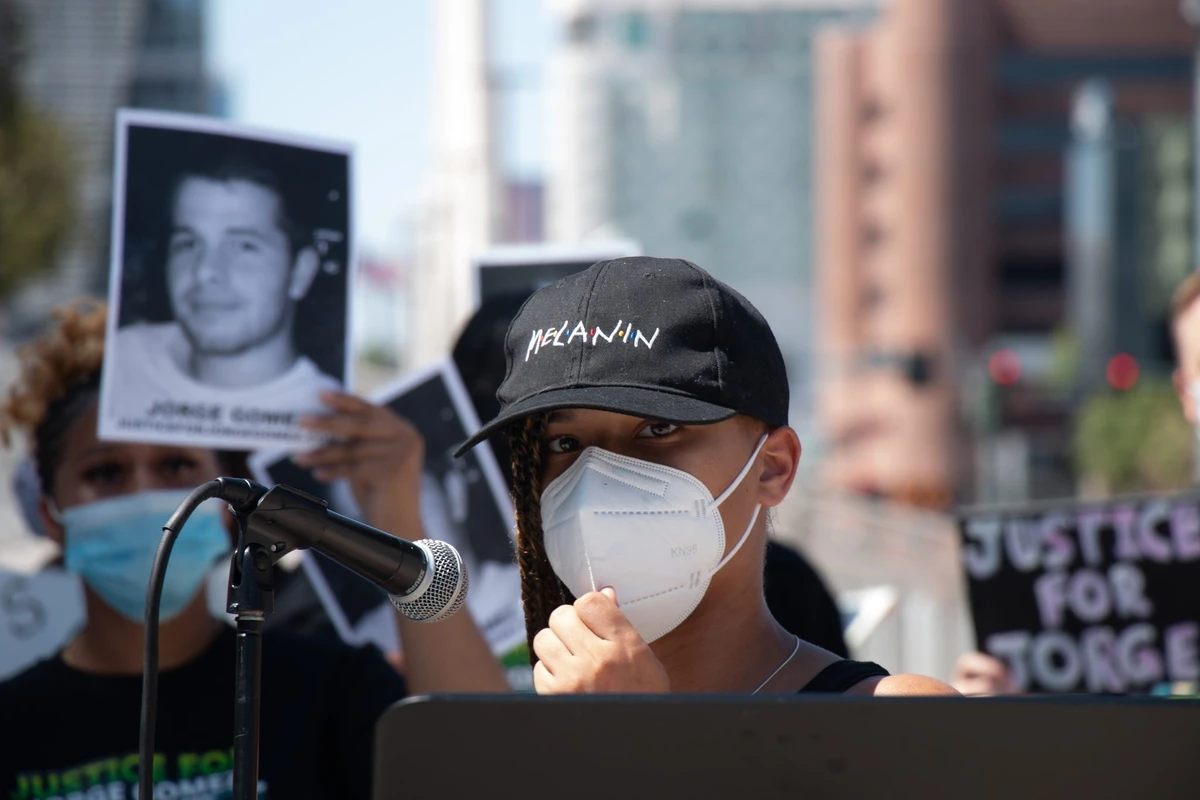
LJ Radney: Sister Thomas McEniry- Murdered by LVMPD November 24th, 2015
LJ is a member of More Than a Hashtag – a protest organization that formed after the killing of George Floyd. Her brother was shot by LVMPD eight times by an officer that claimed his taser failed to work. Her brother was crying with his hands up and he was falling to the ground when he was killed, and was clearly having a mental health crisis. Even though this was the case, he had nothing in his hands AND the officer involved had used the excuse of a taser not working before, the DA refused to indict the officer. She said this proves that they just don’t care.
LJ spoke about use of excessive force by LVMPD, and how even during a pandemic there is widespread use of excessive force. The number of shootings by LVMPD (in the double digits year after year) clearly shows current training for officers isn’t working. In fact, the LVMPD is so problematic that in 2011 the Department of Justice had to step in and recommend a number of internal reforms.
LJ highlighted the fact that we clearly need better training and better data collection and access to data on police use of force. She talked about how frustrating it is that families of police homicide victims are forced to release videos of these murders because police fail to do so. She said how hard it is to be in mourning and fight for police accountability at the same time.
LJ said that the police and media criminalize their loved ones as a way to justify their murder at the hands of police. One’s arrest record and criminal history does not have anything to do with the incident where they lost their life. This is a deflection tactic that has been used over and over again by the state and the media.
Nissa also added that the media is controlled by the LVMPD. She explained that LVMPD cherry pick journalists that are allowed to come to press conferences and groups like FTP and Nevada Cop Block are not allowed in those spaces. They choose what they show to the public and what questions they are willing to answer. This is how they are able to spread lies and withhold any information they want. FU4JLV has actually created 40 demands and this barrier to access is addressed in these demands.
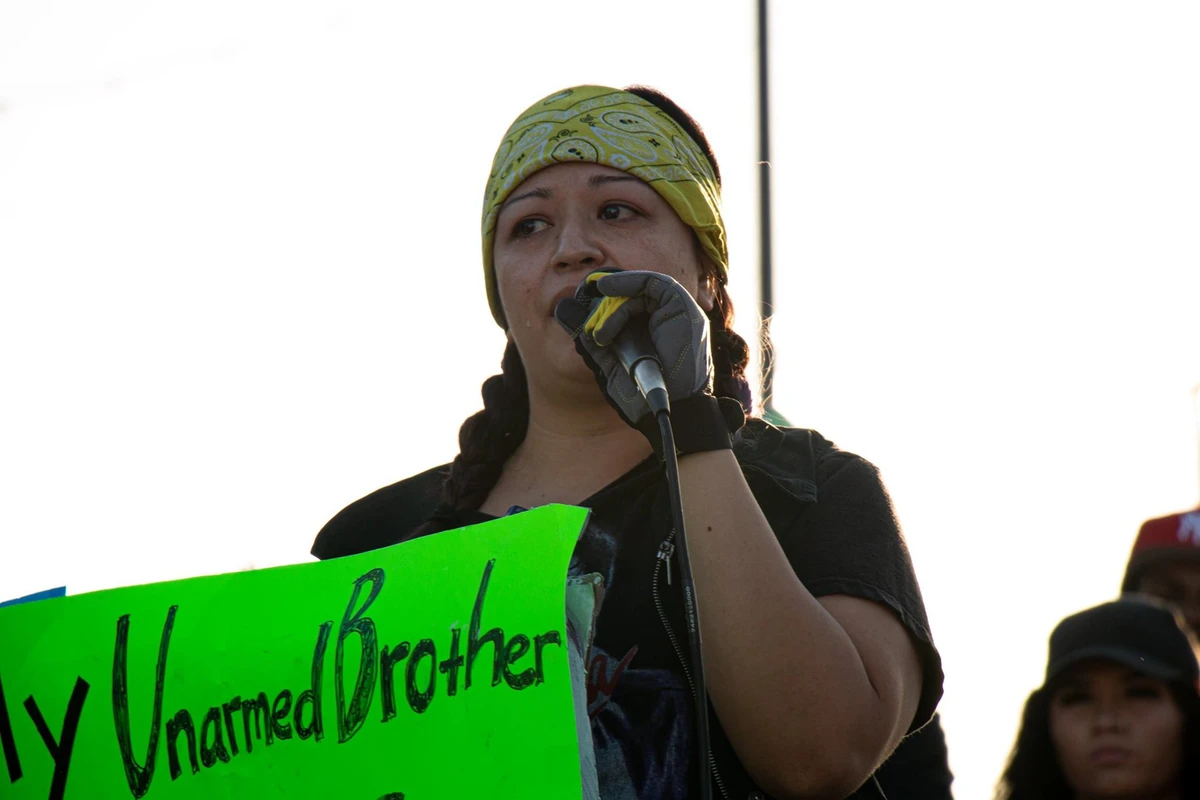
Milu Gonzalez: Sister of Cesar Gonzalez – Murdered by California Highway Patrol, died on September 13, 2007
Cesar Gonzalez was having a mental health crisis while traveling in Baker, California in 2007. After a brief encounter with police and an ambulance crew, (during which time police searched him and found no weapons) he was trying to get the attention of cars passing by. Police arrived again, and even though they knew he was unarmed, they chased him. Officers beat him and kept him face down on the scorching hot pavement. He was so severely burned that his legs were going to be amputated, but he died as a result of his burns in the hospital a month later. He was only 23 years old.
Milu said that this was a reality check about how the world really works. She appreciates this platform and wants to open people’s eyes to the fact that these incidents can happen to anyone. When local people share their stories it makes it more real for people. Policing reforms are happening very slowly, but she still has hope that the system will change for the better.
She talked about how PTSD is very specific to this kind of event, and it’s hard for people to understand. In her case there was little media, no one heard about it because they made it that way. “The less we exist, the more power they have,” she said.
Milu spoke about how police can murder and because of the union and qualified immunity they get their job back and that would never happen in any other profession.
She encouraged people to check out FU4JLV and to learn more about hers and other stories like hers.
Unpacking Legislation on the Table around Policing
The final portion of the call focused specifically on important bills being considered in the current legislative session in Nevada.
Leslie Turner requested people share their support here.
Bills:
- AB 131 – Mandates body camera use by all on-duty peace officers. (Inspired by the Jorge Gomez case where approximately thirty officers were on scene, but were not wearing body worn cameras.)
- AB 133 – Requires training for officers in approaching and interacting with citizens that are open-carrying (Jorge Gomez was exercising this 2nd amendment right when he was murdered by LVMPD)
- SB 50 – Limits the ability of officers to obtain a no-knock warrant. (Unfortunately, there is no accountability piece – if an officer misrepresents why they need it then there can be minimal consequences but it is not enough.)
- SB 236 – This bill creates a data collection system to identify officers with multiple use of force incidents and would make it easier to access data to show which officers habitually abuse the community. We support it even though it does not end qualified immunity and other police protections that prevent accountability.
- SB 409 – Requires screening of police recruits for implicit bias against people based on race, gender expression or identity, religion, mental or physical disability or national origin.
Each of these bills, if passed, will help to transform policing in Nevada and could save lives. It is critical that the community actively voice their support of these bills. You can do this by:
- Tagging your Nevada State Legislators on twitter and telling them you support each of these bills.
- Visiting NELIS and filling out a form stating your support for each bill.
